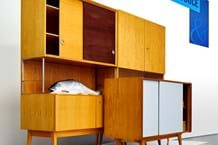Published by Harry N Abrams Inc. (distributors Thames and Hudson). ISBN 0810957116 £30
FOR British officers in the Georgian and Victorian periods it would have been unthinkable to set off on a military campaign in Africa or India to deal with assorted “fuzzie-wuzzies” without the comforts of home. The only difference between the fine furniture of the statelies and the campaign sort was that they could be folded up, packed in boxes, and, without nails or tools, reassembled in “some corner of another foreign field that was forever elegantly furnished England”.
Social status was all and gentlemen officers stationed abroad ordered elaborate suites of the ingeniously designed and elaborately styled furnishings, including bidets for the ladies, and manufacturers such as Chippendale, Sheraton and Hepplewhite furiously competed for commissions. Nicholas Brawer’s book on “knock down” furniture details for the first time this merger of commerce and craftsmanship.
The first chapter deals with British campaign furniture as a reflection of British society, where it is noted that because there was no tax on furniture carried from England as personal baggage, Her Majesty’s finest took as much clutter as they possibly could....campaign furniture packed flat so it was the obvious choice. In 1810, firms such as Morgan Sanders published broadsheets advertising dining tables that could seat 20 yet folded up into the floor space of a large Pembroke table, in a box only 10 inches deep, a dozen portable dining-room chairs could be packed into the space of two chairs and sofas could be transformed into four-poster tented beds complete with drapery and bedding. Not your average kit for Kosovo.
When the population of England and Wales doubled between 1751 and 1821, lack of living space – “a deficiency of bedrooms” – stimulated the demand for campaign furniture, and one chapter covers this domestic demand... “a bed by night, a chest of drawers by day”. The chapter Elegance Abroad: A Portfolio includes a “before and after” series showing pieces in packed and assembled states – ease of assembly probably 10/10 – and chapter III is a directory of British campain furniture designers, makers, outfitters and patentees, which will interest collectors and dealers. With 275 illustrations, many from Phillips of Hitchin (Antiques) – Jerome Phillips wrote the foreword – this is a lively and readable book on the history of campaign furniture and the ingenuity of the furniture-makers.
As for the officer class; one who equipped himself with 600lbs of personal baggage while on military service during the Peninsular War opined: “The more an officer makes himself comfortable the better he will do his duty.” One can only agree with Arnold Foster, the Secretary of State for War’s comment in 1903: “The British Army is a social institution prepared for every emergency except that of war.”
Campaign Charlie is my name…
British Campaign Furniture: Elegance Under Canvas 1740-1914, by Nicholas A. Brawer




